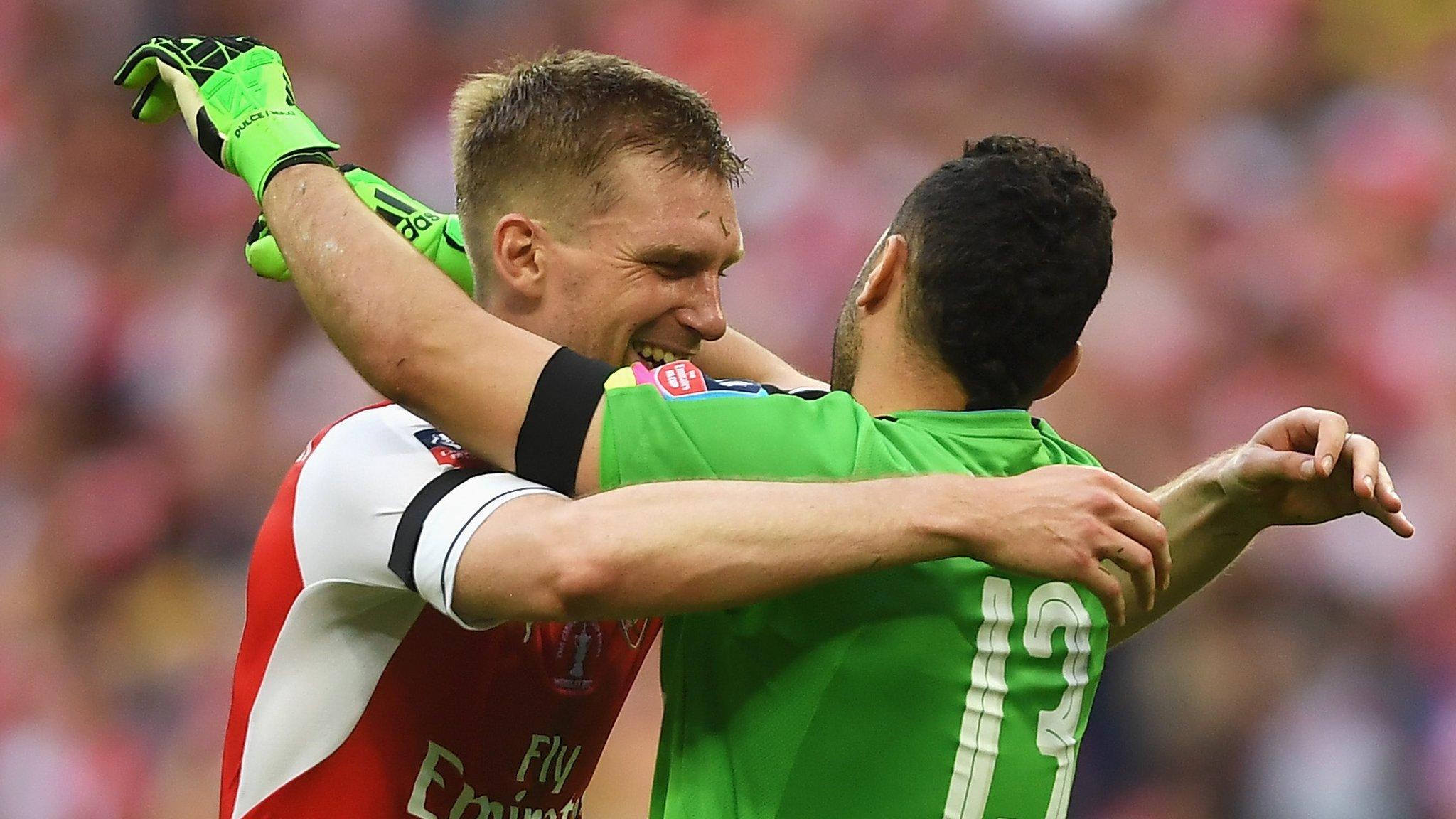Arsenal win the FA Cup: What next for Arsene Wenger and the Gunners?
- Published
- comments
Arsene Wenger revealed his historic seventh FA Cup final success was so special he would be keeping his medal to remind him of the thrilling Wembley victory over Chelsea.
The 67-year-old Arsenal manager is clearly not sentimental about his keepsakes - but the sub-plots surrounding this unlikely 2-1 victory meant it was impossible for him to disguise his pride and elation among the celebrations.
Wenger complained in the build-up that the criticism he has received this season was "a disgrace" and something he will "never forget".
And there was even more intrigue in the aftermath as his future after more than 20 years at Arsenal was still shrouded in uncertainty before a board meeting on Tuesday.
Lack of respect towards me a disgrace - Wenger
What now for Wenger?
Wenger was a contrast in moods in his post-match media briefing, heaping praise on his players while clearly bristling at his treatment from a section of Arsenal's support this season - with protest marches before matches, and banners calling for him to leave seen both inside and outside Emirates Stadium.
The man who has now brought a seventh FA Cup win of his tenure - as well as three Premier League titles, including two domestic Doubles - clearly believes he should have been afforded more faith, respect and support given his work and commitment.
It is a fanciful notion that, as he said, supporters should simply support once matches start but he has clearly been wounded by the discontent aimed in his direction this season.
Wenger confirmed his future would be clarified this week, with the smart money on an extension of his stay but still an air of uncertainty after a triumph that was fully deserved as Arsenal produced a magnificent display to overpower the Premier League champions.
He insisted he would never accept the "very hostile" environment Arsenal have faced at home this season, and there was a lingering sense that even if he stays, there will be something about his relationship with some supporters that will never quite be the same again.
Wenger was right to assert that an Arsenal career of more than 20 years, and effectively the immediate future of the club, should not come down to one game - but there is no escaping the significance of this FA Cup final win.
Had Arsenal lost, and lost heavily as many expected, the mood could have been so dark that even Wenger's most fervent supporters might have wavered after failure to qualify for the Champions League for the first time in two decades.
Instead, this was a win and a performance that demonstrated Wenger can still win major trophies, can still produce a gameplan to beat the best in the Premier League, and can still provide some sort of answer to those who believe he is the man who changed the face of English football but is reluctant to change himself.
When Arsenal's board meet on Tuesday, he can produce the FA Cup as tangible evidence to strengthen his hand in what he says will be a joint discussion about whether he and the club's decision-makers believe he is the man to take the club forward.
What Arsenal's board must decide is whether they can find anyone who is more likely to be successful than Wenger. And he may have to decide whether he can accept certain structural changes as Arsenal, as they have to do, look ahead to the post-Wenger years.
The joyous scenes at the final whistle, with Wenger arms aloft in triumph in front of Arsenal's ecstatic support, were a far cry from the tension around Gander Green Lane in February, when there was the whiff of an FA Cup shock in the air as the Gunners took on non-league Sutton United on the back of a 5-1 Champions League humiliation at Bayern Munich.
Amid the questions, one thing is certain - this victory, and the manner in which it was achieved, with the sort of aggression, commitment and attractive attacking football that is the Wenger hallmark, at least provides a highly satisfactory basis for discussions this week.
Wenger proud of 'outstanding' Arsenal
What must happen at Arsenal?
Arsenal's third FA Cup win in four years is the sort of problem plenty of teams in the Premier League would love to have - but this does not mean serious matters can be ignored in a huge summer for the Gunners.
Aside from the pressing issue of Wenger's situation, Arsenal must also resolve the futures of their two most marketable and talented players - Alexis Sanchez and Mesut Ozil.
Former Arsenal defender Martin Keown, a cornerstone of Wenger's early successes, believes the pair have been indulged,, external and there is plenty of evidence to suggest he has a point.
At Wembley, though, Sanchez and Ozil were in the sort of form that suggests their manager is right to afford them a little special treatment.
Sanchez, alongside the tireless Danny Welbeck, was Arsenal's spearhead. He scored their opening goal after four minutes, was a direct, aggressive, pacy threat and was a danger every time he got on the ball.
Ozil was at his graceful best - although he should have scored in the first half - and raised gasps of surprise and joy from Gunners fans with a tackle of such weight it left Eden Hazard writhing in agony in a moment that summed up Arsenal's ferocity.
For all their high maintenance, this pair give Arsenal an extra dimension when firing and need to be kept. Granit Xhaka also finally looks like the player who cost £29m from Borussia Monchengladbach last summer.
And what of the future for men like Alex Oxlade-Chamberlain and Theo Walcott? Once again, they have not produced consistently. Will Wenger continue to show patience with obvious, but often frustrating, talents?
Wenger insists Arsenal only need one or two players of the highest quality, but they must be mentally as well as physically strong because, while he pointed at a blip in March, Arsenal's problem is that blip usually occurs when the Premier League pressure is on, hence no title challenge for 13 years.
And yet, most of all, it comes back to clarity over Wenger's future.
He is clearly unhappy at the uncertainty and hostility this has caused, but he must share - with Arsenal's board - the blame for allowing the situation to drag on unresolved, and for discontent to fester in some quarters.
This is a summer of great significance for Arsenal - and the next few days will produce the most significant moment of all.
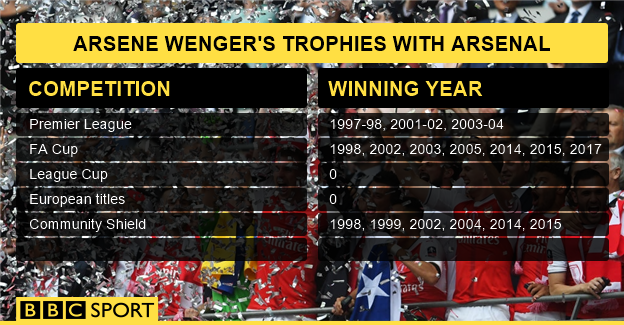
Wenger's bravery rewarded
They say fortune favours the brave - and Wenger's willingness to take a chance with his team selection was rewarded with what he will regard as one of the sweetest triumphs of his career.
Injuries to Gabriel and Shkodran Mustafi, as well as the suspension of Laurent Koscielny - Arsenal's best central defender, meant Per Mertesacker had to blow away the cobwebs caused by having only 37 minutes of action this season.
The popular 32-year-old proved there was no substitute for experience, with a virtuous display of defending. No matter that he was short of game time, match sharpness and has never possessed serious pace - he was faultless.
Wenger was effusive in his post-match praise, saying: "Per Mertesacker is a perfect example for any young professional football player. What he did today was the consequence of an unbelievable attitude every day even when he was not selected.
"When he was not selected, he worked even harder and that is why I will pay a special tribute to him."
Mertesacker, a World Cup winner with Germany in 2014, used every piece of knowledge, every mile on his football clock, to compensate for a season of inaction to be in the right place at the right time every time.
It was his first start for Arsenal in 392 days - and yet it was arguably his finest performance since he joined the club in August 2011.
Wenger also took a big risk in playing goalkeeper David Ospina ahead of Petr Cech in what is likely to be his final appearance for Arsenal before a summer move.
Cech figured in the semi-final and will have been disappointed to miss out. And Wenger's decision looked in danger of backfiring when Ospina's weak attempt at a save resulted in Diego Costa's equaliser.
Ospina was Wembley's most relieved man when Aaron Ramsey headed Arsenal back in front, then the Colombian redeemed himself with a crucial save from Costa to ensure the FA Cup was on its way back to Emirates Stadium.
This was Wenger's day. He got everything right and the FA Cup is his prize.
Wembley gets an FA Cup final classic
The FA Cup has faced the usual questions about whether it still retains its old glamour - but this was a final befitting what has been an outstanding competition this season.
Sutton United and Lincoln City, beaten by Arsenal in the fifth and sixth rounds respectively, provided the old-fashioned magical element, while the two semi-finals at Wembley were testimony to how seriously the FA Cup is taken by the heavyweights and how precious it remains on our sporting calendar.
Arsenal beat Manchester City, and Chelsea beat Spurs to set up a final that was a thriller from start to finish, with a controversial opening as Sanchez's goal was initially ruled out for offside then given, a contest flowing with chances and attacking football and a late twist when Costa's equaliser was answered instantly by Ramsey's winner.
Chelsea were not at their best, Arsenal did not allow them to be.
Antonio Conte's side looked leg-weary and were overrun for long and painful periods, as if they had climbed the mountain once by winning the title and could not find the strength for a second assault on the summit.
Arsenal, in contrast, continued their recent upturn with an exuberant, fiercely competitive display and should have won more convincingly, with Welbeck and Ozil hitting the woodwork and Chelsea's Gary Cahill clearing off the line in the first half from Ozil and Ramsey.
The sun shone. Wembley basked in glorious sunshine. The final itself was close to a classic.
The FA Cup proved once again the old magic lingers on.
- Published27 May 2017
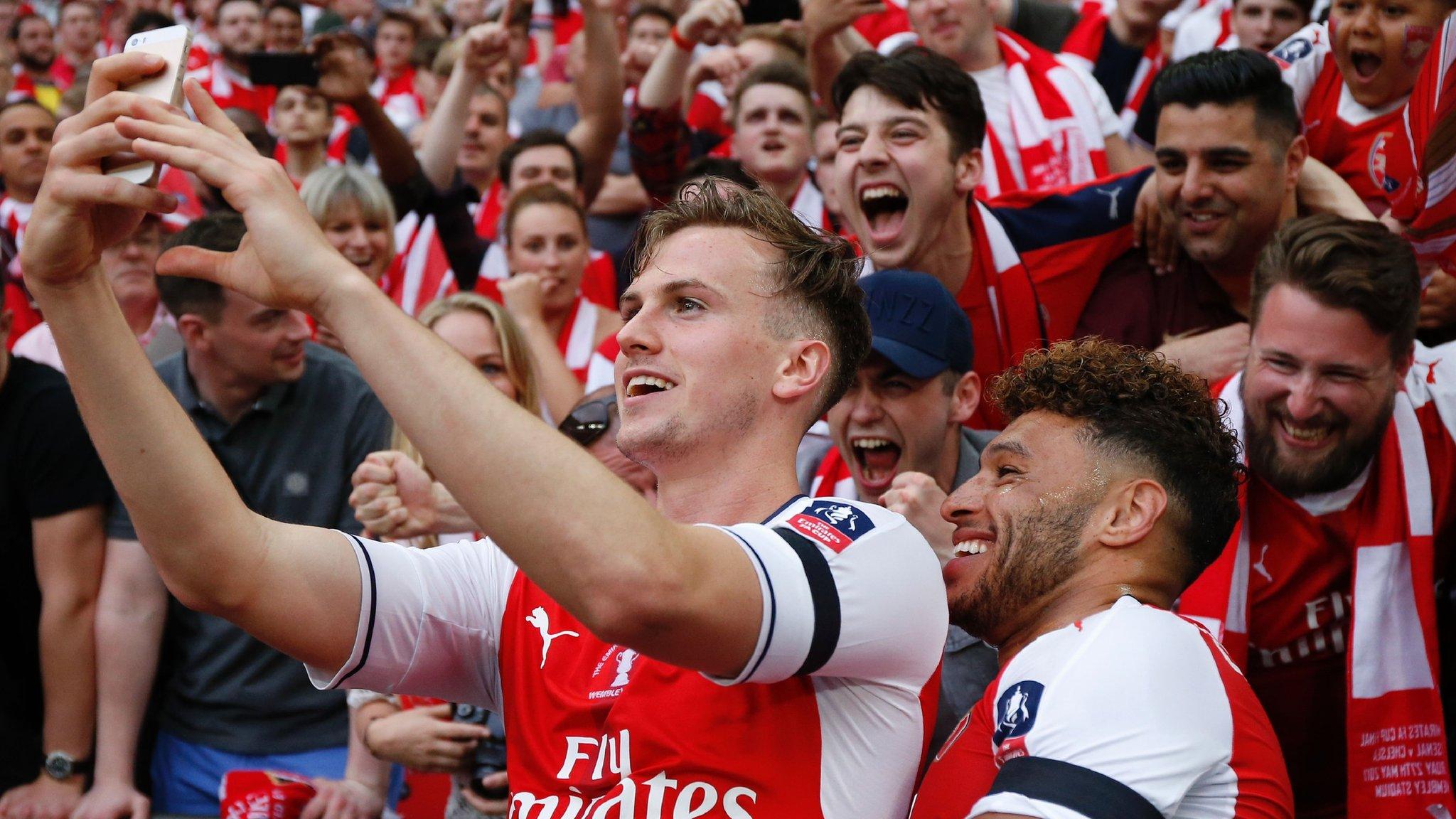
- Published27 May 2017
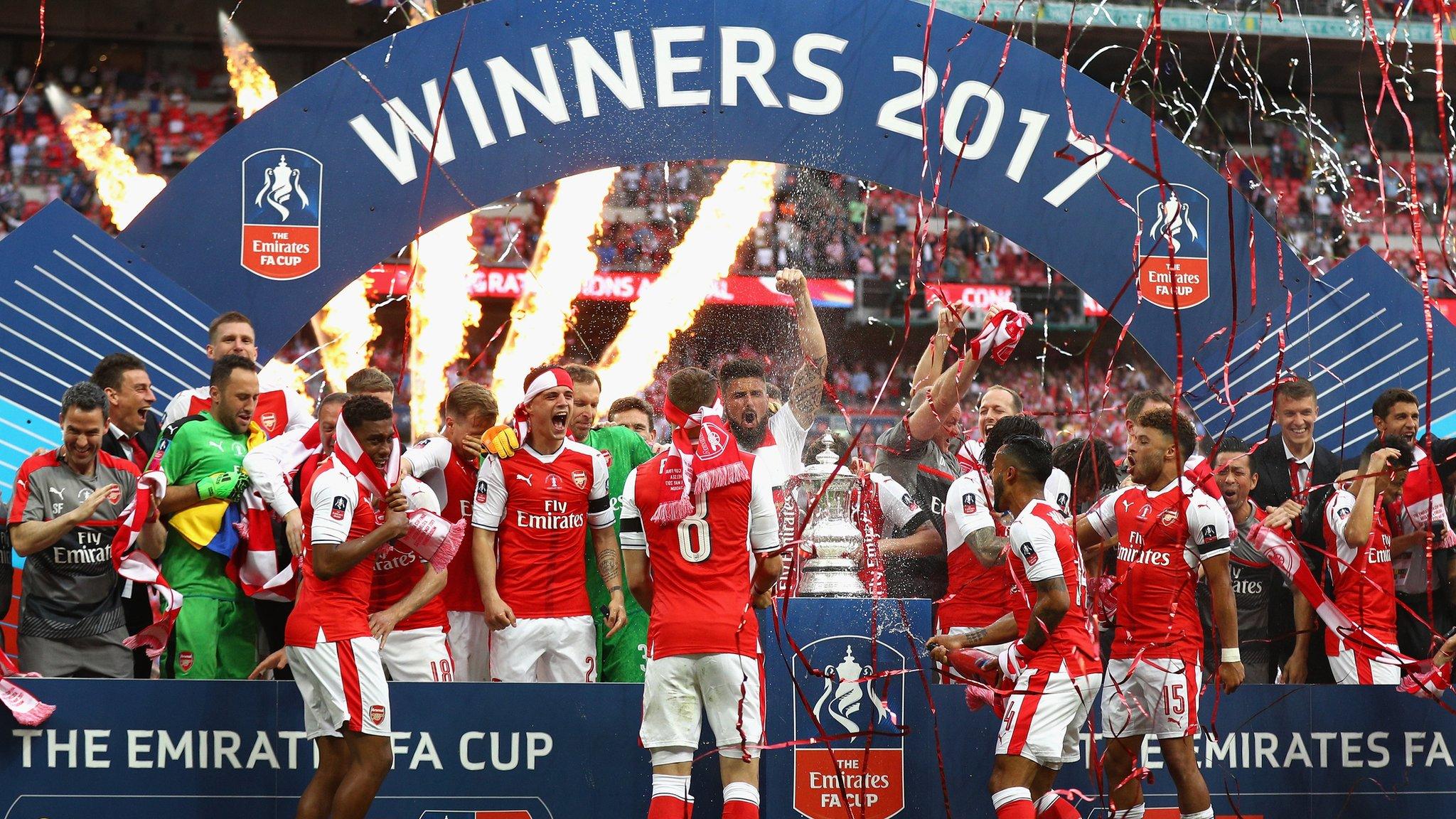
- Published27 May 2017
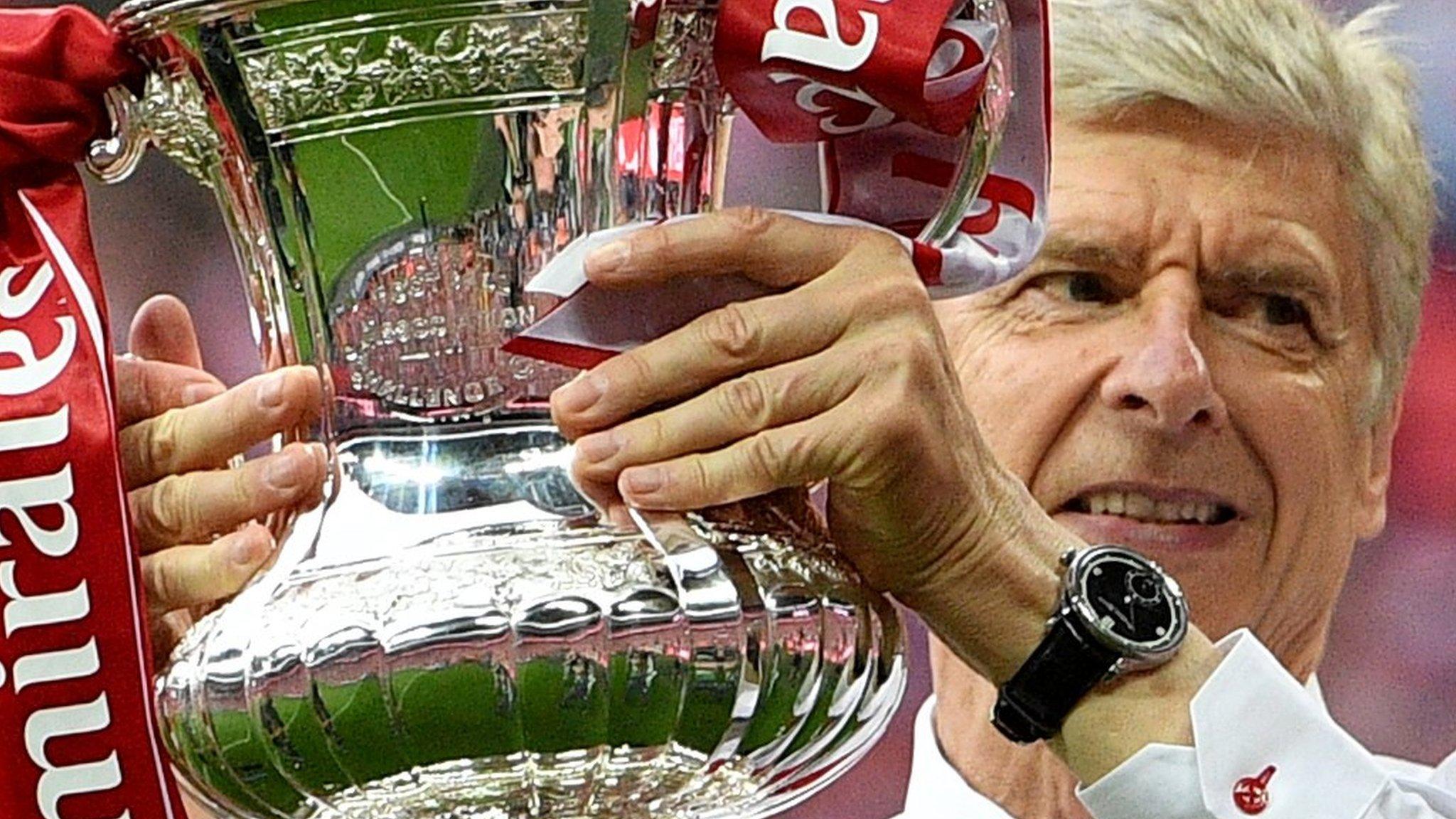
- Published27 May 2017
